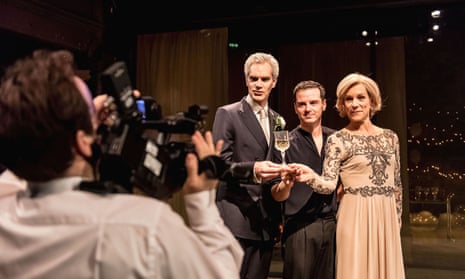After a sell-out run at the Almeida, Hamlet has transferred to the West End and is an all-consuming marvel. This vigil of a production, directed by Robert Icke, reminds us of the extent to which Hamlet is about surveillance. Designer Hildegarde Bechtler has seized stylishly on modern ways of being watchful – including a patchwork of screens. Hamlet’s father’s ghost is sighted on CCTV. Who, in this play, is not a spy? Almost everyone is spying on someone, and Andrew Scott’s Hamlet is at pains to remind us that, at the theatre, we spy on ourselves.
In dishevelled black, his frantic prince could pass as a contemporary theatre director. He warns the players against overstatement yet allows his own hands comic freedom. Scott ranges from natural distraction in his aspect to theatrical flamboyance, his fingers in SOS mode – animated starfish. Each soliloquy sounds as though he were thinking it for the first time as he mixes the conversational with the histrionic. Hamlet may be in doubt but Scott is not – he is a brilliant communicator and ensures that Shakespeare’s language never sounds archaic.
Icke directs Gertrude and Claudius so that their sexual infatuation is blatant. You won’t see a more involving Gertrude than Juliet Stevenson – maternal, sensual and tormented. Claudius is the ultimate smooth operator – coercive and given to smarmy platitudes (exemplary performance by Angus Wright). We see there is every reason for Hamlet to be eye-rollingly vexed by his stepdad’s urbane machinations.
Peter Wight’s tremendous Polonius is more than a windy old fool tying sentences up in knots. He is emotional, serious, loving to his children – worthy of respect as well as of ribbing. As Laertes, Luke Thompson is meticulously accomplished and Jessica Brown Findlay’s wonderful Ophelia makes something fluent out of the fragmentation of madness – appearing in a wheelchair, as if paralysed by circumstance.
At every turn, Icke opts for whatever is needed to extend the emotion of the play. This includes his use of Bob Dylan’s music. Not Dark Yet pours into the final duel – with the line “Feel like my soul has turned into steel” accompanying the flash of foils.

Comments (…)
Sign in or create your Guardian account to join the discussion